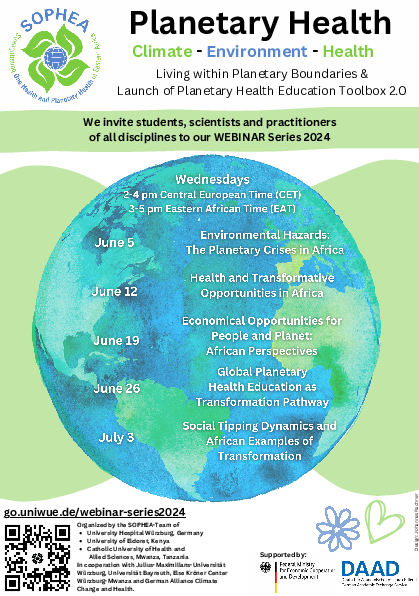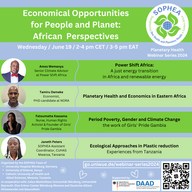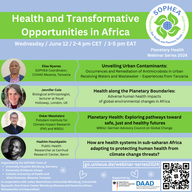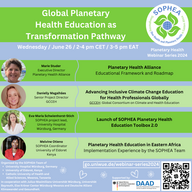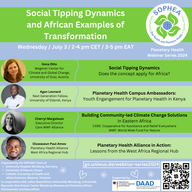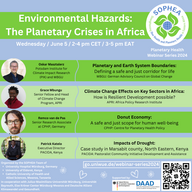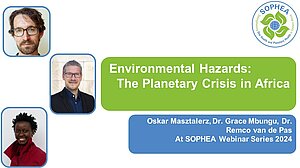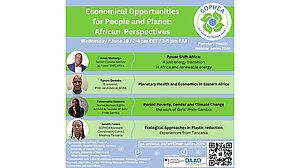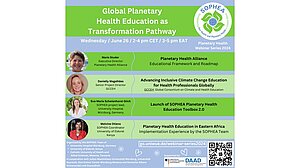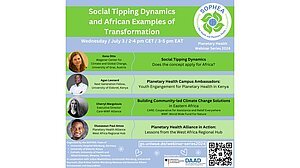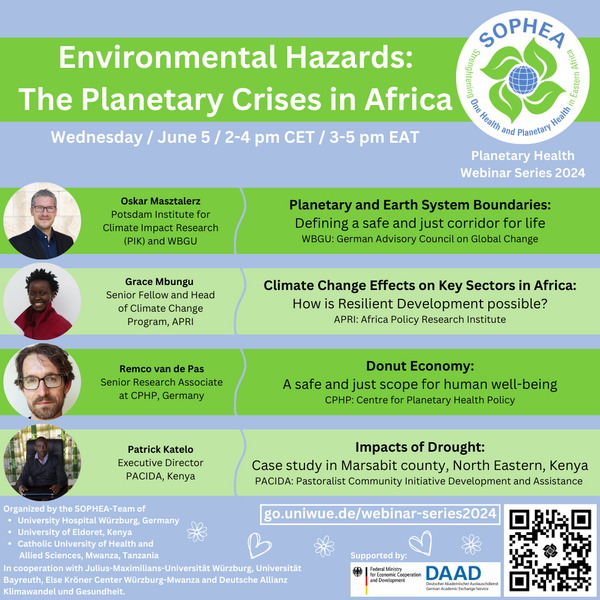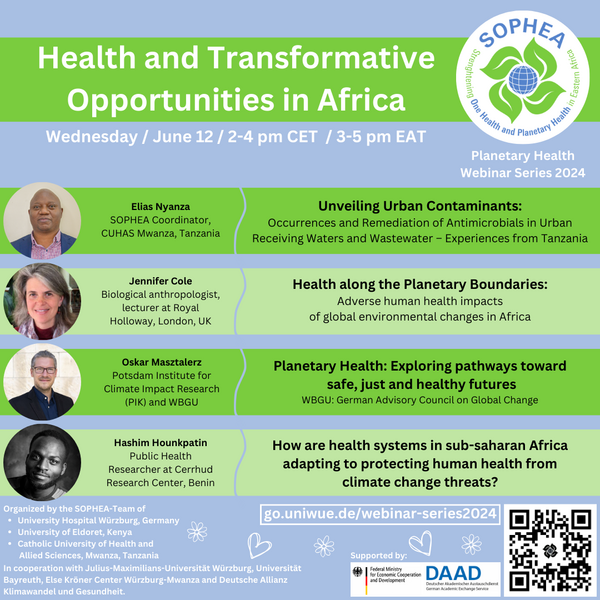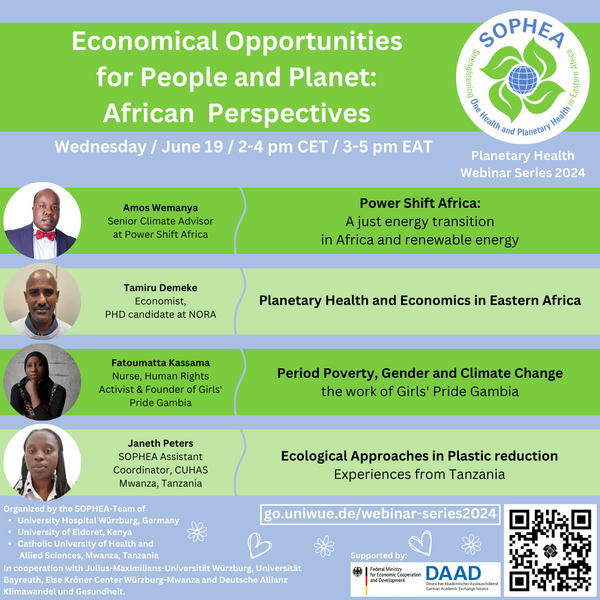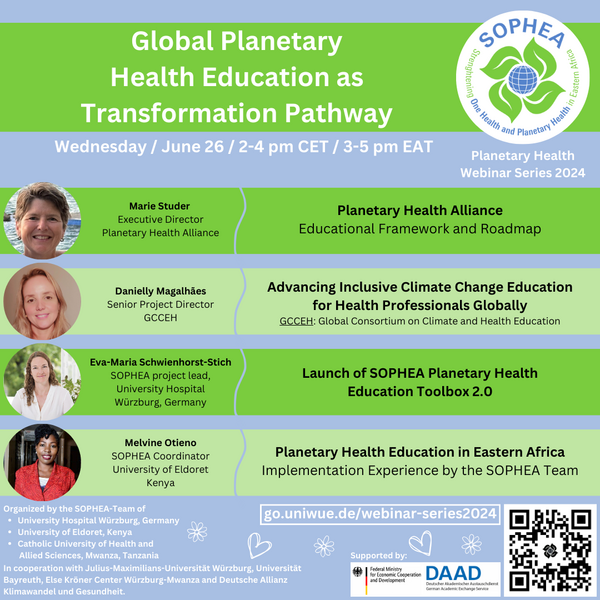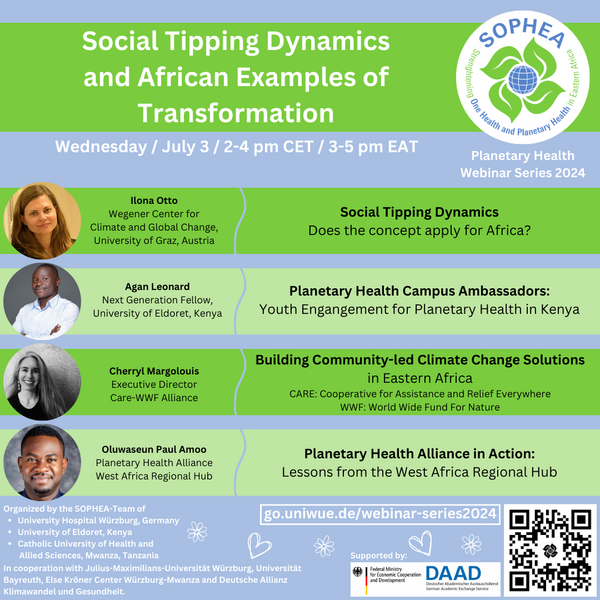Webinar Series 2024
Register for all 5 webinars here
Living within Planetary Boundaries
& Launch of SOPHEA Planetary Health Education Toolbox 2.0
Education can tip our global society and
transform it to a better, healthier and fairer world.
Every year, the SOPHEA Project runs a series of educational events to strengthen One Health and Planetary Health in Eastern Africa and beyond inviting international students, scientists and practitioners to engage across disciplines on the most critical questions of our time.
To welcome an ever larger and wider community, grow our network, exchange our knowledge and share stories for success, the SOPHEA Project organizes a webinar series open to everyone interested in Planetary Health.
During five online sessions we will hear from internationally acknowledged experts and practitioners on latest trends, existing challenges, visions for tomorrow and initiatives worth scaling up.
The webinar series will also launch the SOPHEA Planetary Health Education Toolbox 2.0, a free online platform with blended teaching and learning tools for Planetary Health Education in Eastern Africa and beyond.
Dates and Timing
Wednesdays, June 5 - July 3, 2024 - 2-4 pm CET / 3-5 pm EAT
Find the video recordings of the past webinars below
Speakers

Oskar Masztalerz
Oskar Masztalerz is a planetary health scientist and educator based in Berlin (Germany). Being both a medical doctor and geographer by training, he sees the intersection of environmental change and health as his natural habitat. Since he was one of the first campus ambassadors of the Planetary Health Alliance in 2018, he has dedicated his work to advancing planetary health as a research field, scientific discipline and movement, and is an enthusiastic advocate and pioneer in the field of planetary health education in Germany. He regularly gives lectures, seminars and workshops on the subject at various universities and institutions such as the Charité - Universitätsmedizin Berlin. Oskar has been working with the Climate Change and Health research group of Prof. Sabine Gabrysch at the Potsdam Institute for Climate Impact Research (PIK) for several years. Since 2022, he has also been a research analyst with a focus on health at the German Advisory Council on Global Change (WBGU), which advises the German federal government on global environmental change. As part of his work at WBGU, he has worked extensively on health systems in the context of environmental change, focusing on their transformative potential, and has contributed to the Council's recent flagship report 'Healthy living on a healthy planet'. In the past, Oskar has carried out fieldwork investigating the physiological and psychological health effects of contact with nature and green spaces in cities. His interests lie in building bridges between Earth system science, social sciences and planetary health, advocating a systemic, transdisciplinary, decolonial and intersectional approach to environmental change, and promoting justice and deep transformations as cross-cutting themes in planetary health.
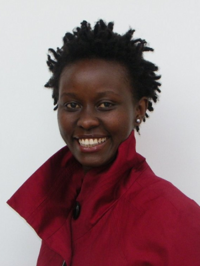
Dr. Grace Mbungu
Dr. Grace Mbungu is a Senior Fellow and the Head of Climate Change Program at the Africa Policy Research Institute (APRI), supporting policymakers with timely and evidence-based policy options to enable the creation of long-term, sustainable, and inclusive wellbeing and livelihood opportunities. Before joining APRI, Dr. Mbungu was a research associate at the Institute for Advanced Sustainability Studies (IASS), now RIFs where she worked on topics such as the politics and governance of the global energy transition, social performance, and opportunities of renewable energy development with a focus on the Global South. She holds a Bachelor’s degree from Bowling Green State University in political science and gender studies as well as a Master’s degree in public administration, with a focus on human rights and international development. She also holds a Doctorate from the University of Stuttgart, Germany.
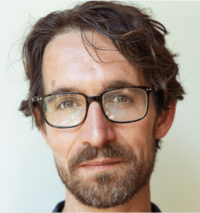
Dr. Remco van de Pas
Remco van de Pas is a research fellow at the Centre for Planetary Health Policy (CPHP). Before joining CPHP, he was a researcher and lecturer in global health policy at the Institute of Tropical Medicine in Antwerp. He also worked as a policy advisor for Wemos, a public health foundation working for social justice, and as a medical coordinator for the NGO Médecins Sans Frontières, mainly in West Papua, Indonesia. In Rotterdam, he gained experience as a doctor in the psychiatric care of refugees and migrants. His research and teaching activities focus on planetary and global health governance, its political economy and foreign policy with special attention to health systems strengthening, health financing and workforce employment, care economics, socio-ecological determinants of health, public health functions, globalisation and its impact on equity.
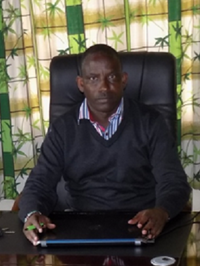
Patrick Katelo
Patrick Katelo Issako was born and brought up as a peasant pastoralist from Northern Kenya, with humble background as a true son of highly mobile community who earn their livelihood through active mobility in the vast range land where water and pasture are available for utility.
The wind of fortune came along my way and I happened to be among the first to be enrolled in school by the then only urgent of development, Catholic Missionary Priest. Attended Maikona Primary School and graduated to class Five to SKM Primary School, where on completion of primary grade, I was admitted to Moyale Secondary School, where after Form Four I did managed to join teaching profession. My noble profession as a career teacher was shortened after I developed interest in community development and joined the world of social development and humanitarian services.
In 1993 I joined FARM AFRICA Pastoralist Development Project as Education Coordinator for Marsabit , Moyale and Samburu District. On my exceptional performance earned Scholarship to undertake Diploma in Social Development at St Francis Xavier University in Nova Scotia-Canada.
After completion I returned back to Kenya and joined Christian Childrens Fund, now renamed Child fund Kenya as Program Manager. Again went for further education and attained degree in social science from Egerton University - Njoro Campus. Later joined Norwegian Church Aid Somalia as a Program Manager.
After active service with NCA I returned back to Kenya, Marsabit County and registered a local Organization Pastoralist Community Initiative and Development Assistance ( PACIDA) as a founder member I become the first Executive Director and to date PACIDA actively work in Northern Kenya and also registered in Ethiopia as one of the leading charity organization.
Currently I also play a critical role as active official of Community practicing small arm in East Africa Region. Managed to complete my Masters in conflict resolution and peace building. Played crucial role in community peace dialogue and voluntarily disarmament in the Northern Corridor covering Kenya, Ethiopia and Somalia. A great team player in peace and negotiation among the worrying Communities of Northern Kenya. A well reknown social scientist and rolled out several development wing like community conservancies to minimize human and wild life conflict. Currently also National Chairman of Kenya Camel Association and got national recognition awarded HSC by H.E the president of republic of Kenya for exemplary performance in Humanitarian, Development and Peace Nexus.
Speakers
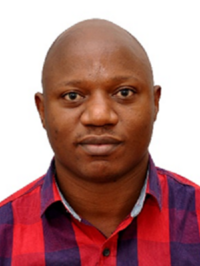
Dr. Elias Nyanza
Elias C. Nyanza, PhD, a population and public health specialist working on Planetary Health in Tanzania. Specifically, I seek to reduce harmful environmental exposures that affect marginalized populations through research and community-based interventions.
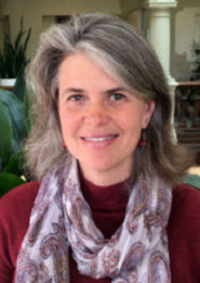
Dr. Jennifer Cole
Dr. Jennifer Cole is a Lecturer in Global and Planetary Health at Royal Holloway, University of London. She is a biological anthropologist with a background in policy research. She was Northern European Hub Coordinator of the Planetary Health Alliance from 2019-2022 and Public Health Policy Advisor, Rockefeller Foundation Economic Council on Planetary Health at Oxford University from 2017-2019. Her own research focuses on human behaviour in response to social and environmental drivers of health risk, in particular with regard to antimicrobial resistance and vaccine hesitancy.

Oskar Masztalerz
Oskar Masztalerz is a planetary health scientist and educator based in Berlin (Germany). Being both a medical doctor and geographer by training, he sees the intersection of environmental change and health as his natural habitat. Since he was one of the first campus ambassadors of the Planetary Health Alliance in 2018, he has dedicated his work to advancing planetary health as a research field, scientific discipline and movement, and is an enthusiastic advocate and pioneer in the field of planetary health education in Germany. He regularly gives lectures, seminars and workshops on the subject at various universities and institutions such as the Charité - Universitätsmedizin Berlin. Oskar has been working with the Climate Change and Health research group of Prof. Sabine Gabrysch at the Potsdam Institute for Climate Impact Research (PIK) for several years. Since 2022, he has also been a research analyst with a focus on health at the German Advisory Council on Global Change (WBGU), which advises the German federal government on global environmental change. As part of his work at WBGU, he has worked extensively on health systems in the context of environmental change, focusing on their transformative potential, and has contributed to the Council's recent flagship report 'Healthy living on a healthy planet'. In the past, Oskar has carried out fieldwork investigating the physiological and psychological health effects of contact with nature and green spaces in cities. His interests lie in building bridges between Earth system science, social sciences and planetary health, advocating a systemic, transdisciplinary, decolonial and intersectional approach to environmental change, and promoting justice and deep transformations as cross-cutting themes in planetary health.
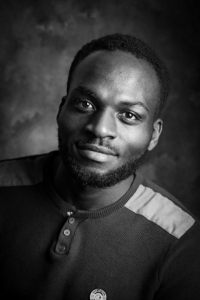
Dr. Hashim Hounkpatin
Hashim Hounkpatin is a medical doctor and public health researcher. His work on climate change and health was awarded the Antwerp prize for global research in 2023. He is dedicating his energy and career to contribute to a healthier people in healthier planet, starting from the west african epicenter.
Speakers
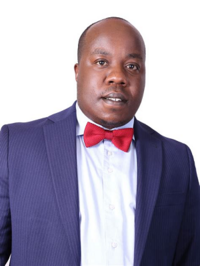
Amos Wemanya
Amos Wemanya is a Senior Climate Advisor at Power Shift Africa, heading Just Energy Transition initiatives. As an advocate for climate justice across Africa, Amos leads the development of strategic initiatives to achieve a Just Energy Transition towards 100% renewable energy in Africa. His expertise on climate change has positioned him as a key figure in advocating for a sustainable and equitable energy future in Africa.
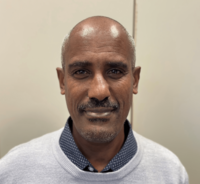
Tamiru Demeke
Tamiru Demeke is originally from Ethiopia and currently doing his PhD in Martin-Luther-University Halle, Germany in Health Economics specifically breast cancer. Very soon he will defend his dissertation. Moreover, he has an MA in Project Management and MSc in International Economics. He is teaching health economics in Addis Ababa University, School of Public Health. He has a consultancy and research company and is mostly working in the Health Economics area and Project Evaluation.
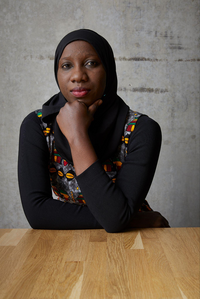
Fatoumatta Kassama
Fatoumatta Kassama is a freelance nurse, social entrepreneur, human rights activist, and servant leader with over 12 years of experience in the field of Global Public Health. For 7 years, she served with the Ministry of Health of The Gambia in clinical roles. She is the Founder and Chief Executive Officer of Girls’ Pride Group, a hybrid organization based in The Gambia. Through her organization, she advocates for gender equality and provides eco-friendly and reusable sanitary pads, reusable period underwear, and reusable period boxers to menstruators from less privileged backgrounds in The Gambia. Fatoumatta also conducts training sessions for schoolteachers and community members-adolescent boys, girls and young men and women on how to make hand-made reusable sanitary pads as a sustainable and eco-friendly solution to address period poverty in local communities. Additionally, she educates menstruators on the importance of using reusable sanitary products as positive climate mitigation actions, enabling them to manage their periods with dignity, reduce their carbon footprints, prevent sewage system blockages, and protect the environment, animals, waterways, and water bodies from plastic waste generated by single-use disposable pads and tampons. She utilizes game-based learning, particularly through the Funneh Board Game she developed at the International Sustainability Academy in Germany to facilitate her educational initiatives in The Gambia.
In 2023, Fatoumatta worked for the Society for the Study of Women's Health (SSWH) as an Individual Consultant and as a Co-Principal Investigator for seven months on an implementation research project titled 'Shifting Gender Norms for Improved Maternal and Adolescent Health in The Gambia funded by IDRC.
Ms. Kassama has been recognized for her leadership and contributions to various initiatives. She is a Mandela Washington Fellow, One Young World Ambassador and Delegate Speaker, OPEC Funds for International Development (OFID) Scholar & OFID Young Leaders Award winner, Obama Foundation Leader, African Presidential Leadership Program Alumnus, World Youth Forum Delegate, Tony Elumelu Entrepreneur, Youth Excellence Award winner, Friends4SDGs Ambassador, Because Accelerator Entrepreneur, Change Now Summit Delegate, World Health Summit Delegate, International Sustainability Academy Fellow, and the former Acting President and Vice President of the National Association of Gambian Nurses and Midwives.
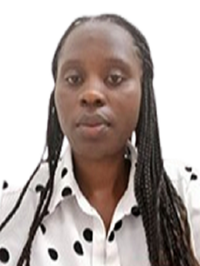
Janeth Peter
Janeth Atieno Peter (BA, MA) is an Assistant Lecturer at the School of Public Health at the Catholic University of Health and Allied Sciences. With a background in social Sciences. She brings a unique perspective to her role, particularly in understanding the complex interactions that exist between Planetary Health social dynamics and Public Health. Janeth has a strong desire to investigate how, in the context of East Africa, human health and planetary well-being is related.
Janeth recognizes that social and cultural activities have a big impact on human health, which is why she is so interested in Planetary Health as well as socio-cultural determinants of health. She believes that addressing Environmental challenges requires a holistic approach that integrates social, cultural, and ecological perspectives.
In her teaching role, Janeth strives to inspire the next generation of public health professionals to consider the broader implications of their work on both human populations and the planet. Through her commitment to strengthening One Health initiatives in East Africa, she aims to foster collaboration across disciplines and promote sustainable solutions for a healthier future.
Speakers
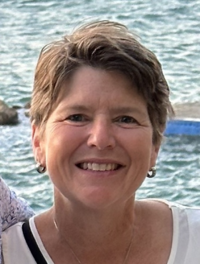
Marie Studer
Marie Studer is an executive leader with more than 20 years of scientific and education program and operational experience delivering results for mission-oriented non-profit organizations and multi-institutional consortia working at the intersection of community development and environmental advocacy. As a collaborative leader, Marie has worked closely with stakeholders to create strategies, partnerships and innovative approaches to deliver programs that provide measurable outcomes.
Her career has focused on public accessibility and understanding of science through government and public policy positions, to scientific and education leadership for international citizen science projects, to engaging formal and informal educators and youth in biodiversity learning using hands-on and online resources and tools. She is especially interested in creating awareness and action using the Planetary Health framework to address the United Nations Sustainable Development Goals (SDGs) and other international targets focused on large-scale transformational change to enable a regenerative society where all life can thrive for generations to come.
She has held positions as Staff Scientist for the Massachusetts Bays National Estuary Program, Chief Scientist for Earthwatch Institute, and as Director of Learning + Education for the Encyclopedia of Life (EOL). She serves on several boards and committees for organizations working to support sustainable communities and environments.
Marie has been with the Planetary Health Alliance since 2020. She holds a Ph.D. from the University of Massachusetts Boston in Environmental Sciences and a B.A. from Wheaton College in Chemistry.

Danielly Magalhães
Dr. Magalhães is the Senior Project Director at GCCHE, Columbia University. Originally from Brazil, she has been living in DC for seven years. She is an Environmental Health Scientist with expertise in Global Health, Sustainable Development, Climate Change, Biodiversity, and Toxicology. She is a Biologist with an MPH in Environmental Toxicology and Occupational Health, a PhD in Environmental Chemistry, and a specialization in Global Health and Health Diplomacy. She conducted postdoctoral research on the effects of pollution on human reproduction at George Washington University. Dr. Magalhães has also worked at Fiocruz in Brazil, initially focusing on Ecotoxicology and later on Global Health initiatives, including the Rio+20 Conference and the 2030 Agenda for Sustainable Development, with a particular focus on environmental policies and their health impacts.
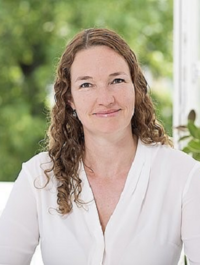
Eva-Maria Schwienhorst-Stich
Dr. med. Eva-Maria Schwienhorst-Stich is a medical doctor with clinical experience in pediatrics and "tropical medicine"/infectious diseases for several years. She has obtained a Diploma in Tropical Medicine and Public Health (DTMPH) from the Charité and a MSc in International Health (MScIH) and Master in Medical Education (MME) from Heidelberg University. She has worked for several years as a global health consultant for the German Leprosy and TB Relief Association (DAHW/GLRA) based in the headquarters in Germany with field visits to various countries in Asia, Africa, and Latin America. She has been teaching on global health topics at various universities and ran a summer school on tropical medicine and global health at Medmissio in Würzburg for several years. She has been head of the medical skills lab at Würzburg University medical faculty for three years and is about to finish her Masters in Medical Education (MME). After having learned about the dramatic extent and the urgency regarding the triple planetary crises - climate change, biodiversity loss and pollution - her current focus is advancing planetary health education and action locally, nationally and internationally, the latter through the SOPHEA project. Apart from being a "scientivist", she is a mother of three daughters and deeply concerned about how our actions today determine the future living conditions on our planet earth.

Melvine A. Otieno
Melvine A. Otieno is an Environmental Health scientist and the founder of Planetary Health Eastern Africa. As a climate change activist in Kenya, she has worked closely with KLUG- German Alliance Climate Change and Health in Climate Change and Health/Planetary Health Leadership online course-Transformational and transdisciplinary. She obtained a BSc in Environmental Biology and Health and MSc in Environmental Health at the University of Eldoret. She is currently pursuing her PhD in Global Health at Martin Luther University in Haale(Saale), Germany. She served as a Next Generation Network Fellow (2020-2023) of the Planetary Health Alliance, working to inspire, activate and convene the next generation of planetary health campus ambassadors from around the world, as well as conduct outreach to facilitate local and international collaborations.She's also an Associate team member of Women Leaders for Planetary Health. As an Early Career Researcher, Melvine has worked on several internationally funded projects as Research Assistant for Newton Utafiti fund on Aquaculture (2018-2019) and BGS-UoE-MU research on dynamics of Environmental Geochemistry and Health in the Lake Victoria Basin (2020-2022) and a Co-Investigator on the GCRF QR Time Urgency Grant, to investigate the role of wet markets and backyard livestock in supporting nutrition of preschool-aged children in Kenya: challenges from COVID-19 influenced closure (2021-2022). She is currently an Assistant Lecturer at the University of Eldoret (Kenya), School of Environmental Sciences and Natural Resource Management where she coordinates SOPHEA project-Strengthening One and Planetary Health in Eastern Africa, funded by DAAD in partnership with JMU Würzburg University in Germany and Catholic University for Health and Allied Sciences (CUHAS) in Tanzania.
Speakers
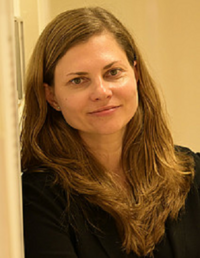
Ilona M. Otto
Prof. Dr. Ilona M. Otto holds the Professorship in Societal Impacts of Climate Change at the Wegener Center for Climate and Global Change, University of Graz. She leads a research group focusing on Social Complexity and System Transformation. The group’s ambition is to use complex science theory and novel research methods to analyse social dynamic processes and interventions that are likely to spark rapid social changes necessary to radically transform the interactions of human societies with nature and ecosystem services in the next 30 years. Previously, she spent 10 years at the Potsdam Institute for Climate Impact Research.
Prof. Otto is a social scientist by training. She uses various research methods including social surveys, case studies, behavioural experiments, and simulations in analysing problems related to global environment changes, development, adaptation and sustainability.

Agan Leonard
Agan Leonard is an Environmental Health Scientist. He holds a bachelor’s degree in Environmental Biology and Health and a Master's Candidate of environmental Health at the University of Eldoret. He is a Graduate Assistant at the Department of Environmental Sciences since 2020 with professional interest in Environmental Health, Planetary Health, and Environmental Toxicology. His current research involves investigating the dynamism of Potentially Toxic Elements within environmental matrices and the use of sentinel organisms and biomarkers in monitoring pollution trends to inform public health in Africa.
Agan has been involved in Planetary Health movement since 2019; he became a Planetary Health Campus Ambassador in 2021 to 2023 and has been involved in various Planetary Health research and project collaboration where he is determined to advocate for Planetary Health Education and solutions that are scientific and evidence-based. He currently coordinates public communication and community outreach for the Planetary Health Eastern Africa Hub and a member of the PHAM 2024 education working group.
As a Net Gen Fellow, 2024, Agan brings his unique perspectives, skills, passion, dedication, and experience to inspire the next generation network of PHCA members to ensure sustainability, innovation and collaboration among the diverse global network of Planetary Health next generation members.
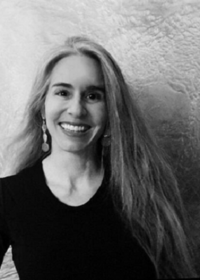
Cheryl Margolouis
Cheryl Margolouis is the executive director of the CARE-WWF Alliance. Through the Alliance, Cheryl bridges the teams at WWF and CARE to address the complex issues facing the world today, bringing in CARE's expertise in topics such as gender equity, livelihoods, and climate justice with various WWF programs to achieve greater conservation outcomes and improve community well-being.
Cheryl’s career has focused on helping organizations achieve the greatest impact through programs that integrate conservation, climate, livelihoods, and health, with a focus on women and girls. It is through this lens that she guides the work of this unique and cross-cutting partnership.
Cheryl has worked in conservation organizations and development organizations throughout her career. Her first job out of college was as an intern with WWF. She always knew she would return! Her previous position before joining the Alliance was at a global health organization, creating the global program Women-led Climate Resilience.
Cheryl has also worked to bring conservation into education, founding a bilingual 'green' school in Central America and serving as a professor of tropical ecology and human ecology for nine years at the Pitzer College program in Costa Rica. She lived and worked in Guatemala and Costa Rica for 15 years before moving back to California recently with her family. She is passionate about supporting women throughout the world and serves as a board member for the UN Women USA San Francisco Bay Area Chapter.
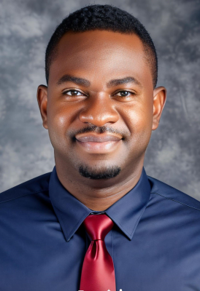
Oluwaseun Paul Amoo
Oluwaseun Paul Amoo (MPH) is a dedicated public health professional with a passion for leveraging technology and innovation to address critical challenges in disease surveillance and prevention. With a Master of Public Health (MPH) from the University of Ibadan, Nigeria, and a background in project management and quality assurance, Oluwaseun leads as the Project Coordinator for the Planetary Health Alliance, West Africa Hub.
In this role, Oluwaseun spearheads collaborative efforts to integrate planetary health perspectives into public health strategies across West Africa. His leadership has been instrumental in fostering effective partnerships and driving impactful initiatives that address complex health and environmental issues. Oluwaseun's expertise extends to implementing innovative solutions and overseeing multifaceted projects aimed at enhancing healthcare delivery and emergency response capacities.
Oluwaseun's commitment to advancing public health is underscored by his active involvement in professional associations and his extensive experience in coordinating research, training, and development projects. His contributions have not only strengthened health systems but also empowered communities to embrace sustainable health practices.


